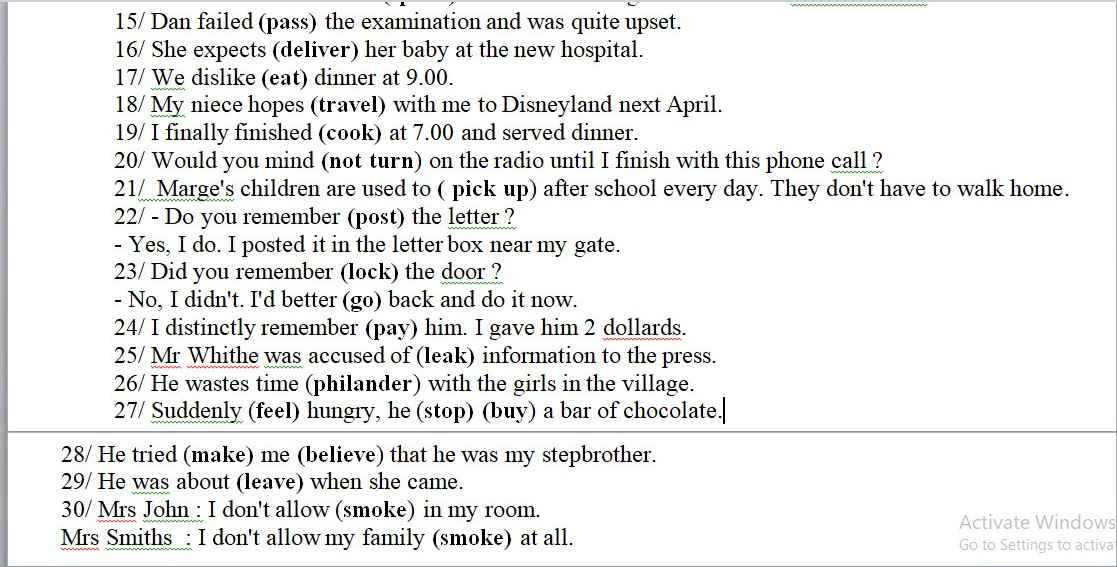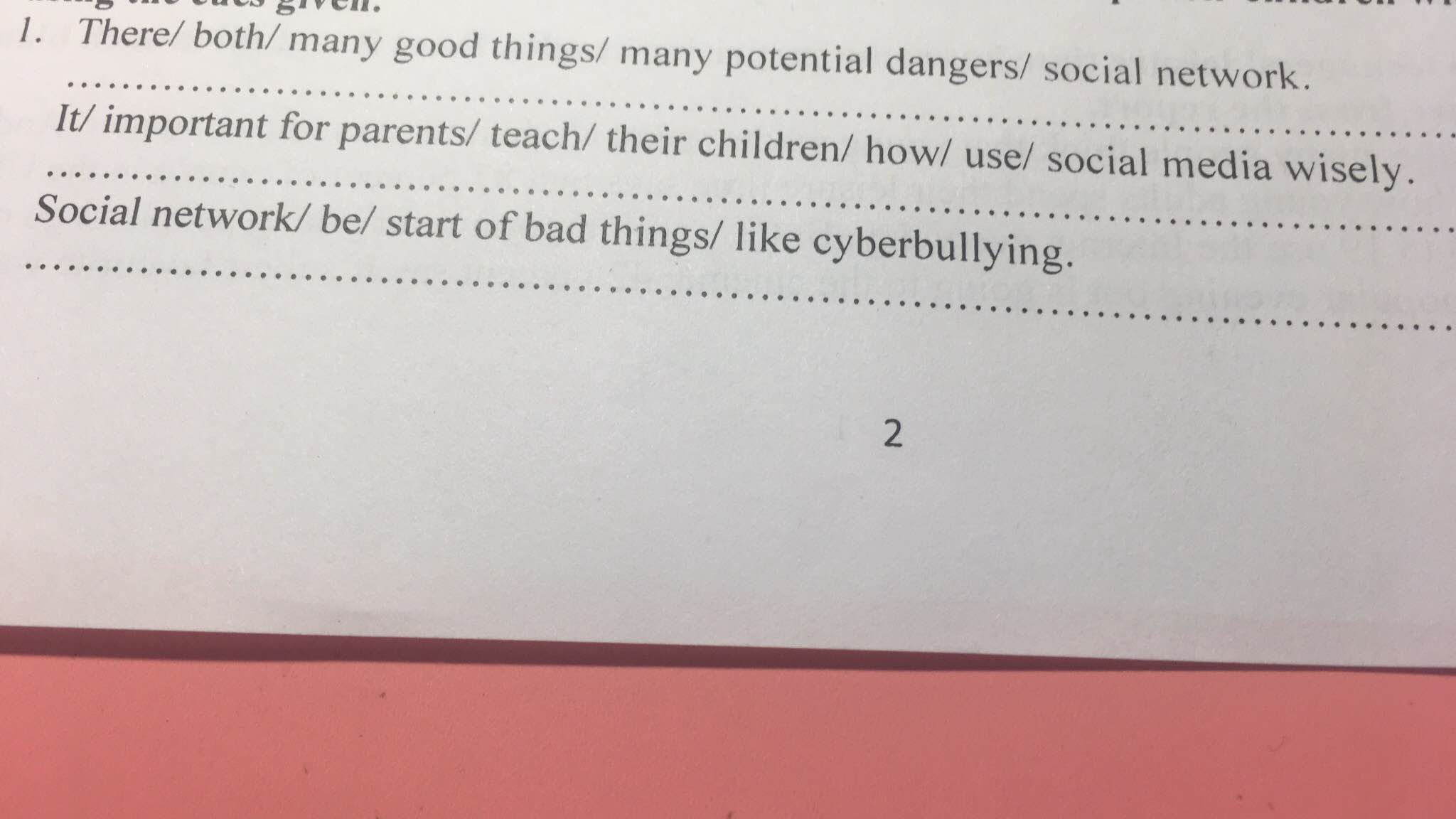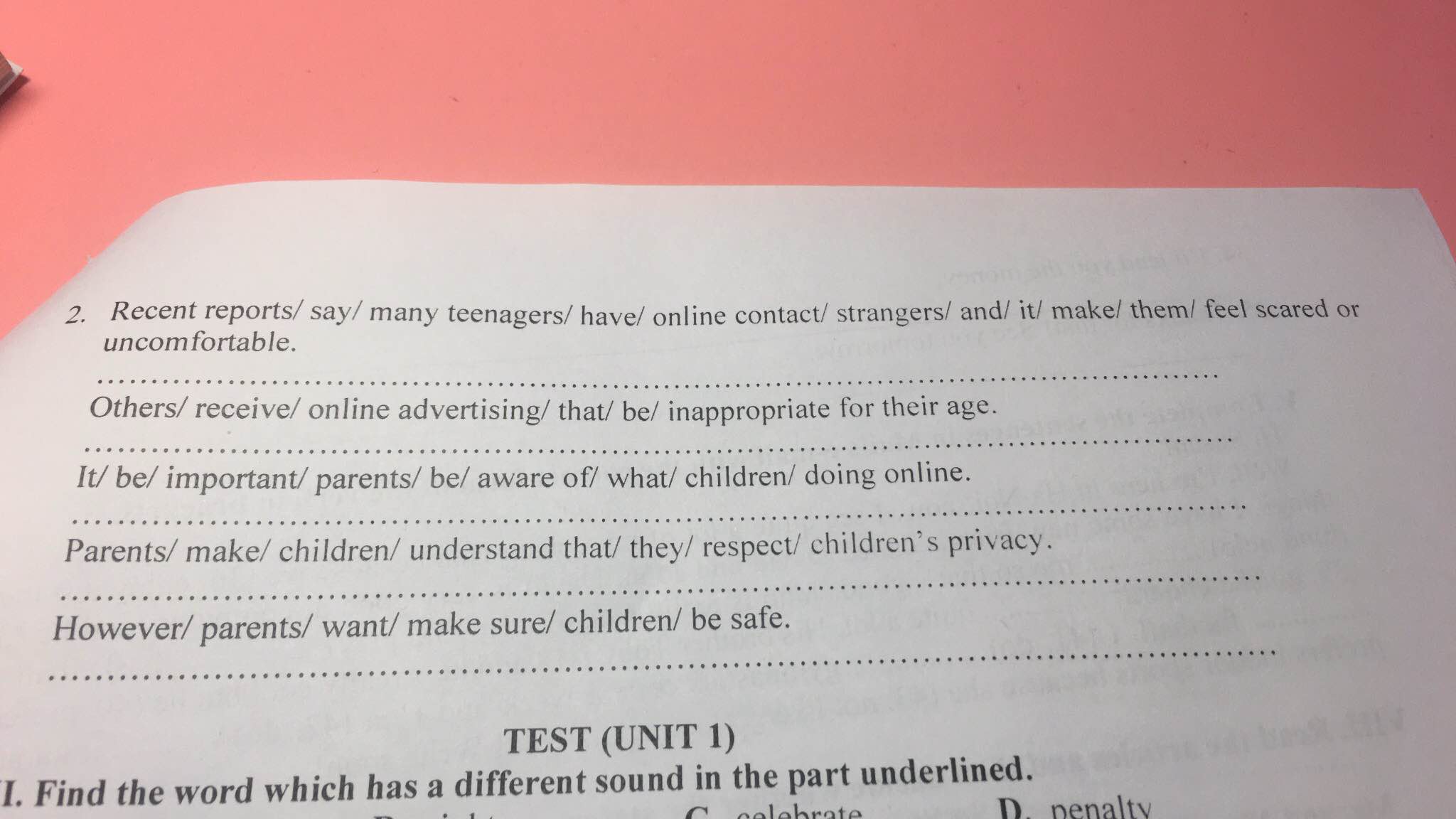Hãy nhập câu hỏi của bạn vào đây, nếu là tài khoản VIP, bạn sẽ được ưu tiên trả lời.

1. I don't enjoy going to the dentist.
2. I used to smoke 20 cigaretts a day, but now i give up on smoking.
3. We decided to rent a house with a swimming - pool.
4. It's difficult to get used to eat with chopsks.
5. Let me pay for the meal. You paid last time.
6. I finished reading the book and went to bd- *bed?*
1. going
2. to smoke...on smoking
3.to rent
4.to get...eat
5.pay
7

1. Tuan loves listening to music every day.
2. Have you ever ridden a buffalo ?
3. The children used to go a long way to school.
4. They hate seeing their son texting his friends all day.
^_^

D. WRITING I. Use the adjectives in brackets in their correct forms of comparison to complete the sentences. (1,0pt)
1/ Some people think that country folk are ……………more friendly……………………. than city people. ( friendly)
chắc vại :3
hc tốt

1.
There are both many good things and many potential dangers in social network
It's important for parents to teach their children how to use social media wisely
Social network is the start of bad things like cyberbullying
2.
A recent report has said that many teenagers have contacted online with strangers and it makes them feel scared or uncomfortable.
Others receive onine advertising that is inapproriate for their age.
It is important that parents should be aware of what children are doing online.
Parents should make their children understand that they respect children's privacy.
However, parents want to make sure that their children are safe.

Questions:
B. Give the correct forrm of the following verbs. (0,5pt)
1. They ..................a nomadic life for six years. (live)
2. Children in this village love ............. kites on summer afternoons. (fly)
C. Write the correct forrm of the adverbs in bracket to complete the sentences (0,5pt)
1. On Sunday morning I often get up (late) ............ than usual.
2. If you want to stay slim, you have to eat (healthily) ......................
Answer:
B. Give the correct forrm of the following verbs. (0,5pt)
1. They ......have lived............a nomadic life for six years. (live)
2. Children in this village love ......flying....... kites on summer afternoons. (fly)
C. Write the correct forrm of the adverbs in bracket to complete the sentences (0,5pt)
1. On Sunday morning I often get up (late) ......later...... than usual.
2. If you want to stay slim, you have to eat (healthily) ......more healthily................
___Học_tốt___
#lyt

Exercise 1. Underline the most suitable future form in each sentences.
Why are you going to buy / will you buy a new mountain bike?
Don’t phone between 8.00 and 9.00. I’ll study / I’ll been studying then.
Look out! That tree will / is going to fall.
Let me know as soon as Louis will get / gets here.
Great news! Jean and Chris will come/ are coming to stay with us.
According to this timetable, the bus is going to arrive/ arrives at 6.00.
Can you call me at this evening, because I’ll / I’m leaving tomorrow.
If you arrive late at the sale, the best thing will go / will have gone.
Exercise 2. Put each verb in brackets into a suitable future form.
By the time we reach home, the rain will have stopped (stop).
This time next week I (lie) will be lying on the beach in Spain.
In ten years’ time I (work). will be working for a different company.
If we don’t get there by 6.00, Jack (leave) will leave
In July they (be married). will have been married for 20 years.
In the year 2500 a lot of people (live) will be living on the Moon.
When you get to the station, I (wait) will be waiting for you outside.
Don’t worried! The plane (land) will be landing/ will land/ is going to land in a moment.
By the time you come home, I (finish) will have finished. the decorating.
Come round between 8 and 9. We (watch). will be watching the match on TV then.
Exercise 3. Put each verb in brackets into a suitable future form.
When I (see) see you tomorrow, I (tell) will tell you my news.
As soon as we (get) get there, we (phone) will phone for a taxi.
I (go) will go to the library before I (do) do the shopping.
We (wait) will wait here until the rain (stop) stops
I (get) will get. £50 from the bank when it (open) open
After you (take) take the medicine, you (feel) will feel better.
You have to stay until you (finish) have finished your work.
I (let) will let you know the minute I (hear) hear the results.
Before we (paint) paint the wall, we (have).will have a cup of tea.
We (climb) will climb over the wall as soon as it (get) gets dark.
Exercise 4. Put each verb in brackets into a suitable future form.
Have you ever wondered what exactly (1) you will be doing (you do) in ten years time? Well, according to the computer expert Tom Vincent, computer (2) will be soon able (soon be able) to make accurate predictions about the future. Professor Vincent, from Cambridge,(3) will hold (hold) a press conference next week to describe the computer which he calls “the Computafuture”. “This computer can tell us what life(4) will be (be) , based on data describing last events”, explains Professor Vincent. For example, Computafuture can predict how many people(5) will live (live) in a parular area, or whether there(6) will be (be) a lot of rain during a parular period. Professor Vincent also believes that by the year 2050, computer (7) will have replaced (replace) teachers, and (8) will also be doing (also do) most of the jobs now being done by the police. “Computer are becoming intelligent all the time”, says Professor Vincent. Soon they (9) will be directing .(direct) traffic and(10) teaching (teach) our children. And telling us about the future.”

1 rides
2. collect
3. didn't go
4. bought
5. haven't plan
6. will go
7. have learnt
8. Has Peter visited
9. listening
10. didn't study
1 rides
2 collect
3 did not go
4 Bought
5 have not planned
6 will go
7 have learnt
8 Did Peter and his parents visit
9 listening
10 did not study




1 to pass
2 to deliver
3 eating
4 to travel
5 cooking
6 not turning
7 picking up
8 posting
9 locking - go
10 paying
11 leaking
12 philandering
13 feeling - stopped - to buy
14 to make - believe
15 to leave
16 smoking - to smoke